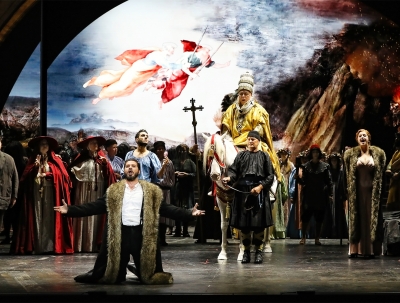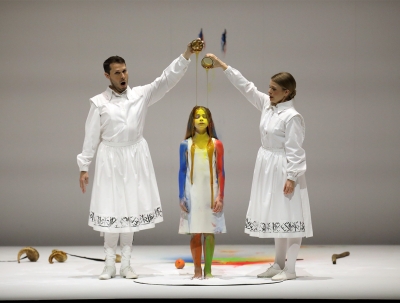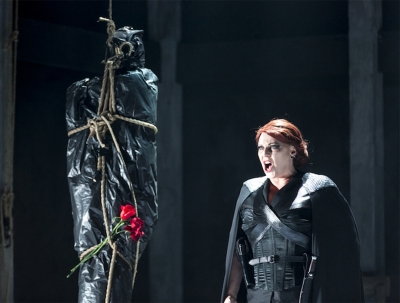Opera
The fearsome figure of Attila the Hun (406–53 CE) has always had a bad press, yet in Verdi’s opera of 1846 he emerges as the most sympathetic and nuanced character of a group of three other rather unlikeable, two-dimensional principals, all of whom plot his final demise. During the course of the opera, Attila emerges as a somewhat naïve, trusting character, and shows great respect for his avowed enemy, the Roman general Ezio. Yet it does not end happily for Attila, ultimately done in by the three of them; almost certainly not a historically accurate depiction.
... (read more)It may be that some members of the audience at Romeo Castellucci’s highly individual take on, and response to, Mozart’s Requiem, experience something similar. I certainly am aware from conversation (and observation) that some audience members did indeed respond to the stage images with closed eyes. But in doing so they denied themselves the opportunity to see and respond to some of the most evocative, poetic, and, yes, musical images seen on the Festival Theatre stage since Bo Holten’s Operation Orfeo back in the 1990s.
... (read more)‘For a moment let’s imagine a world entirely unlike ours,’ asks narrator Eryn Jean Norvill as she sets the scene for this thrilling concert performance of Beethoven’s Fidelio. And yet, 250 years after the composer’s birth, political prisoners are still detained, and worse, for daring to tell truth to power. And lovers? ‘Everyone is imprisoned within their own misdirected desires. Just like real life,’ continues Alison Croggon’s text, written as part of this WASO and Perth Festival commission presented in association with WA Opera, conducted by principal conductor Asher Fisch and directed by Black Swan State Theatre Company’s Clare Watson.
... (read more)For all its intense brevity, Salome is notoriously difficult to stage and perform. Richard Strauss might have adroitly described his opera (first performed in 1905) as ‘a scherzo with a fatal conclusion’, but his great admirer Gustav Mahler was closer to the mark when he said ‘deeply at work in it … is a live volcano, a subterranean fire’. Both points of view were more than justified by this generally fine performance of Salome.
... (read more)Beethoven struggled with his only opera, Fidelio, for more than a decade, composing, rearranging, and composing anew until, in 1814, he declared that the opera would earn him a ‘martyr’s crown’. This tale of Leonore, who infiltrated a Spanish prison disguised as a man to liberate her husband, Florestan, allowed the composer to express his deepest thoughts on justice and freedom.
... (read more)Gale Edwards’s production of La Bohème is back for an extended summer season – sixteen performances no less. This production has been filling theatres since its creation in 2011. It may not run for as long as Franco Zeffirelli’s 1981 extravaganza, still an annual fixture at the Metropolitan Opera, but it probably has another good decade to go. Revived here by Liesel Badorrek, it works considerably better in the tiny Joan Sutherland Theatre than it did in the State Theatre in 2018; the latter is too palatial for bohemian confinement and privations.
... (read more)Always read the fine print. At the base of the program for Pinchgut Opera’s production of Antonio Vivaldi’s Farnace (1727) it reads: ‘The edition of Farnace used in these performances is by Renzo Bez and Diego Fasolis, adapted with insertion arias selected by Erin Helyard.’ Translated this means that what the audience is watching is a version of the opera in which many of the arias are replaced by more popular ones from Vivaldi’s large number of other vocal works – Farnace plus Vivaldi’s greatest hits, as it were.
... (read more)This charming, persuasive, and glowing concert performance of Hansel and Gretel, part of Andrew Davis’s final Melbourne Symphony Orchestra season before he steps down as chief conductor, more than proved (if proof is required) what an outstanding opera conductor he is. Maybe, in future seasons, when Davis returns as the orchestra’s conductor laureate, there will be more: perhaps Berg’s Lulu, another of the maestro’s favourite operas, which the MSO would perform magnificently.
... (read more)Reviewing the recent production of Madama Butterfly in Adelaide, I dwelt on Giacomo Puccini’s ceaseless search for new subjects between operas and how he considered everything from a Zola novel to the historical Marie Antoinette before settling on the story of Cio-Cio San.
... (read more)With certain artists – the luminaries, the abiders – it’s tempting to assign a kind of inevitability to their oeuvres. The musicals of Cole Porter, the satires of Jane Austen, the exiguous poems of T.S. Eliot have a kind of perfection that make them seem nonchalant. But here we run the risk of overlooking the sheer chanciness of most artistic careers – not to mention the false starts and tribulations.
... (read more)









